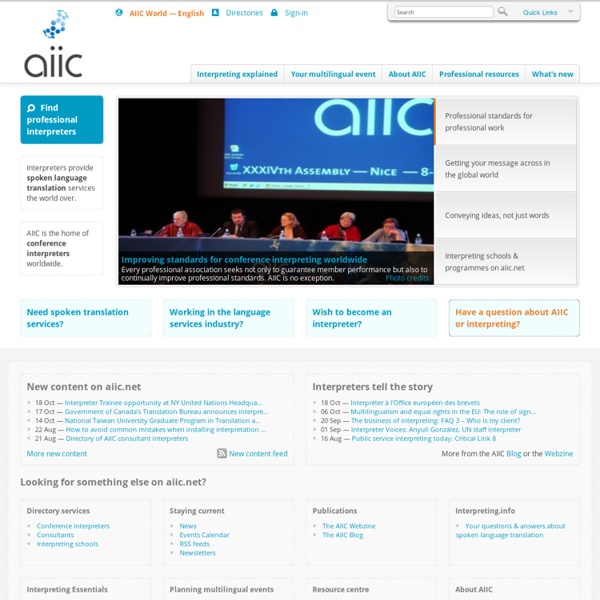



El intérprete es "la voz de la señora" Il y a quelques années, j’accompagnais en Haïti une délégation de parlementaires européens conduits par une députée allemande. Les discussions compliquées par la situation critique du pays se tenaient, en consécutive doublée de chuchotage, dans des lieux peu propices à des réunions mais l’équipe très réduite d’interprètes, à la fois accablée et motivée par ce qu’elle voyait et entendait ne faiblissait pas à la tâche. Un soir, lors d’une conférence de presse, un journaliste d’une radio privée demande à la présidente de la délégation combien de nationalités sont représentées parmi les parlementaires européens. Je traduis la réponse- une énumération- dont la chute est : "et puis, il y a moi qui suis allemande" Ce féminin déclenche immédiatement le fou rire du journaliste qui se tournant vers moi me demande, goguenard, si je suis "allemande". Je réponds du tac au tac que "non, je suis la voix de Madame". Etre la voix de quelqu’un d’autre requiert une certaine maturation.
FIT Europe - FIT Europe Fédération des Jeunesses Musicales Wallonie-Bruxelles – Quand la musique fait la différence Otras modalidades de interpretación: el chat de la Comisión Europea This section will explain the sequence of events concerning both the preparation and the conduct of a Chat. There are 3 distinct phases, each involving specific actions: Before the Chat 1. the date of the Chat the subject of the Chat the main language of the Chat the people that will be involved The existing Plan/Checklist needs to be adapted to the requirements of each Chat. 2. drafting the announcement (DG) translating the announcement into the other official languages (DG) publishing the announcement on the web streaming portal setting up a mailbox for questions sent by email prior to the Chat (DG)The model of the Mailbox to be used is "chat-<commissioner_name>@ec.europa.eu" 3. The Chat is promoted via several means: online promotion via the online press & media, the representations, the delegations and on the (ec.)europa.eu website. 4. (979 kB) . During the Chat 1. 2. A Mailbox is set up by the DG before every Chat so that people can send their questions in advance. After the Chat
Irish Translators and Interpreters Association - ITIA La Maison du Livre Consejos de la UE para trabajar con intérpretes La Dirección General de Interpretación proporciona intérpretes para más de 10 000 reuniones al año. El trabajo del intérprete es hacer posible la comunicación entre interlocutores que no hablan el mismo idioma. Nuestra experiencia nos ha demostrado que en una reunión multilingüe también entran en primera línea de juego las aptitudes de comunicación de los participantes, y tanto más cuanto aumentan el número de idiomas utilizados y la complejidad para organizar la interpretación. Cuando participe en una reunión multilingüe o la presida, piense en la forma en que su mensaje va a llegar al auditorio a través de la interpretación. Estas sugerencias se refieren concretamente a las condiciones de trabajo preconizadas en la Comisión Europea, pero sirven de manera general para cualquier reunión con interpretación. Seguir leyendo...Piense en la interpretación a la hora de preparar su reunión. Ha decidido usted celebrar una reunión con interpretación. Seguir leyendo...Consejos para los oradores
Société française des traducteurs : syndicat national des traducteurs professionnels (SFT) Médiations Asbl Bruxelles Código ético de AIIC (2012) I. Purpose and Scope Article 1 a) This Code of Professional Ethics (hereinafter called the "Code") lays down the standards of integrity, professionalism and confidentiality which all members of the Association shall be bound to respect in their work as conference interpreters. b) Candidates and precandidates shall also undertake to adhere to the provisions of this Code. c) The Disciplinary and Disputes Committee, acting in accordance with the provisions of the Statutes, shall impose penalties for any breach of the rules of the profession as defined in this Code. II. Article 2 a) Members of the Association shall be bound by the strictest secrecy, which must be observed towards all persons and with regard to all information disclosed in the course of the practice of the profession at any gathering not open to the public. Article 3 a) Members of the Association shall not accept any assignment for which they are not qualified. Article 4 Article 5 Article 6 III. Article 7 Article 8 IV. Article 9
TREMÉDICA - Asociación Internacional de Traductores y Redactores de Medicina y Ciencias Afines